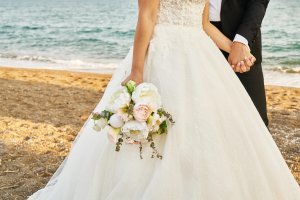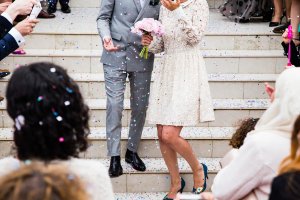Wedding law in England and Wales is badly out of date.
We campaign for marriage to be equally open to all, regardless of religion or belief.
Time for one wedding law for all.
In England and Wales, different laws apply depending on whether a wedding is Anglican, Jewish, Quaker, another religion or not religious at all (a civil wedding or partnership).
This is unfair, confusing and absurd.
Most religious weddings must be held in a registered place of worship, while civil weddings and partnerships must take place in approved premises. Jewish and Quaker weddings can take place anywhere.
This system leads to inequality. Members of religions which don't have fixed places of worship, or don't use their places of worship for weddings, are disadvantaged. And members of nonreligious communities such as Humanism have no way of getting legally married according to their philosophical beliefs.
The process for a place of worship to register itself for marriage is much cheaper than for approved premises for civil ceremonies. This in turn contributes to the cost of civil marriages and partnerships.
Over 80% of opposite-sex marriages in England and Wales in 2019 were civil marriages. But only 16% of recognised wedding venues in England and Wales can hold civil marriages. The remaining 84% are religious venues.
While approved premises for civil weddings and partnerships must by law hold ceremonies for same-sex couples, this is not the case for places of worship. In 2022, only 2% of places of worship were registered for same-sex weddings. This considerably reduces the options for same-sex couples. Whereas opposite-sex weddings are in slow decline, same-sex weddings are increasing.
UPDATE: The Law Commission has now made its final recommendations on reforming wedding law on England and Wales. Please write to your MP in support of the recommendations...
Unregistered religion-only 'marriages'
The complexity of marriage law may contribute to the rise in couples who have religious 'wedding' ceremonies that are not legally-binding.
A signification proportion of Muslim couples are in an Islamic 'nikah' union lacking the full legal rights and protections of a recognised marriage.
Unregistered marriages can undermine women's rights in particular. If a woman in a nikah is 'divorced' suddenly, or against her wishes, she can be left homeless and without any money or assets.
The situation is made worse by sharia councils or 'courts' which dispense religious rulings on Islamic marriage, child custody and divorce. These are not courts of law but there are concerns some Muslim women, especially those not born in the UK or unable to speak English, perceive them as having real legal authority.
Sharia councils leave children vulnerable and discriminate openly against women. To seek a religious divorce a woman must gain permission from these almost entirely male councils, and there are reports of women being denied this request even in cases where they have faced abuse.
Reforming wedding laws will not solve these problems completely. But making wedding laws simpler and fairer can encourage couples to gain the legal protections of a registered marriage.
Take action!
1. Write to your MP
Tell your MP to support the Law Commission's recommendations for wedding reform.
2. Share your story
Tell us why you support this campaign, and how you are personally affected by the issue. You can also let us know if you would like assistance with a particular issue.
3. Join the National Secular Society
Become a member of the National Secular Society today! Together, we can separate religion and state for greater freedom and fairness.
Latest updates
NSS welcomes recommended reform to weddings
Posted: Tue, 19 Jul 2022 08:45
The National Secular Society has welcomed a government-commissioned report recommending reform of wedding laws in England and Wales.
The Law Commission has published a report proposing the removal of restrictions on where and how both civil and religious weddings take place.
The proposals are in line with NSS recommendations made in their response to the commission's consultation last year.
The Law Commission is a statutory independent body which keeps the law in England and Wales under review and recommends reforms where it considers them necessary.
NSS recommendations reflected in report
The NSS has argued for comprehensive reform of marriage law to ensure greater clarity and fairness for all couples in recent years, and has lobbied the Law Commission as part of this process.
The commission recommends introducing an officiant-based system for the legal recognition of marriage, to replace the current restrictive building-based system.
This means all weddings would be legally permitted to take place in a safe and dignified location chosen by the couple, including outdoors.
The proposals would enact several other measures which the NSS has lobbied for:
- Universal legal rules would be introduced for all weddings, with very few exceptions. Different rules currently apply to Anglican weddings, Jewish and Quaker weddings, other religious weddings, and civil weddings.
- A requirement that some ceremonies include "prescribed words" would be abolished. Couples would be able to have religious songs, readings and hymns as part of their civil weddings, provided the ceremony is still identifiable as a civil ceremony.
- New offences criminalising officiants who mislead anyone into thinking they are legally married when they are not. This will help protect people, particularly women in Muslim communities, from unknowingly entering religion-only marriages that offer no legal protections.
They would also allow weddings conducted by non-religious belief organisations, such as Humanists, or independent celebrants to be recognised, if the government decided to permit them.
The commission said the change will remove "the many unnecessary restrictions in the current law" and "address unfairness in the treatment of different group".
NSS: "Greater freedom, equality and fairness for all"
NSS chief executive Stephen Evans called the recommendations "a very good set of proposals that could make marriage ceremonies more personal and bring about greater freedom, equality and fairness for all."
He said: "The proposals are very much in line with our recommendations and reflect the overwhelming public demand for a modern approach to marriage.
"The government should accept these recommendations and work to making them a reality in law."
N. Ireland to adopt marriage law reforms backed by NSS
Posted: Mon, 4 Jul 2022 16:06
Northern Ireland will adopt proposals backed by the National Secular Society to modernise marriage laws.
In a statement on Friday, NI minister of finance Conor Murphy announced that his department will work to prepare for raising the minimum age for marriage to 18 and legalising non-religious belief marriages.
Both reforms were supported by the NSS in its response to the Department of Finance's consultation in February.
The law currently allows people aged 16 and 17 to enter a marriage or civil partnership with 'parental consent'. This increases the risk of forced marriage, particular for young people in insular religious communities, the NSS said. Support for raising the minimum age to 18 was close to unanimous, with 97% of online respondents supportive.
The proposed reforms would also allow couples to have their marriage legally solemnised by a celebrant who subscribes to a non-religious philosophy such as humanism. The NSS backed the proposals as they would bring about "greater equality and fairness". A majority of consultation respondents also backed the move.
The legislation can only be enacted once there is a functioning NI Assembly and Executive.
Marriage in England and Wales
The Law Commission is investigating broader reforms to wedding law in England and Wales, which would include making it possible for couples to have humanist and other nonreligious belief marriages.
The proposed reforms would also bring greater equality, freedom and simplicity to marriages across all religion and belief groups. The NSS supports the reforms, as it has long campaigned to remove barriers to couples wanting to marry according to nonreligious or minority religious traditions.
The Law Commission is due to report on its consultation on the reforms this month.
A recent YouGov survey suggests the demand for nonreligious weddings is likely to increase. Forty-eight per cent of respondents aged 18-24 said they "don't like the religious element associated with marriage".
NSS: Reforms are "extremely welcome"
NSS head of campaigns Megan Manson said: "The Department of Finance's support for modernising Northern Ireland's marriage laws is extremely welcome.
"They will help protect young people from forced marriage while enabling those who wish to legally marry according to nonreligious traditions to do so.
"We hope Northern Ireland's progressive approach will be adopted by England and Wales, where marriage law is still confusing, restrictive and unequal."




